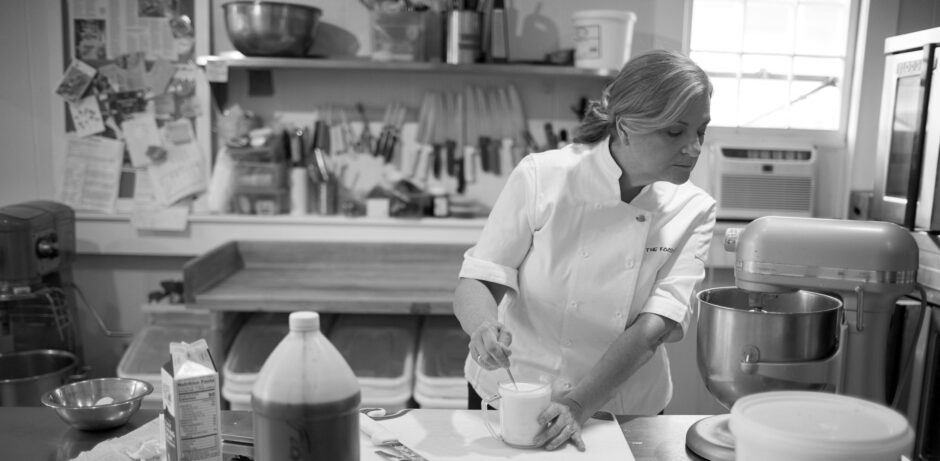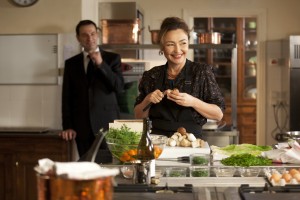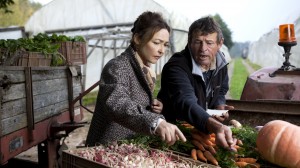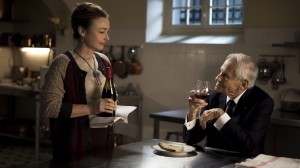The French film “Haute Cuisine” isn’t about haute cuisine at all. In fact, just the opposite.
When I mentioned that little observation to the film’s real-life subject Danièle Mazet-Delpeuch — the farmhouse cook plucked from the Dordogne to serve as French President Francois Mitterrand’s personal chef — she roared with laughter.
“It is certainly not,” she said in her high-spirited French accent at the start of our phone conversation. “I had no choice in the title, but I love the film very much.”
“Haute Cuisine,” a darling of this year’s Cannes Film Festival gobbled up by the Weinstein Company, was originally called, “Les Saveurs du Palais,” a much more clever name since “palais” means both “palace” and “palate” in French.
As studios in the States tend to do, the name was changed for an American palate — although this time something got lost in translation!
Danièle’s story, as told through the actress Catherine Frot as Hortense Laborie, chronicles the cook’s close relationship with Mitterrand who, in his first term, had his fill of fussy food churned out by the Palais de l’Élysée’s Main Kitchen.
For his private meals in his second term, Mr. President, the Republic’s top gastronome (played by Jean d’Ormesson), wanted a woman from the country who could prepare dishes like his grand-mére, not Escoffier.
Naturally, Mitterrand’s love of his cook’s bourgeois fare which showcased the best produce, poultry, meat, fish and dairy products France had to offer instead of the food service staples in the Main Kitchen’s store room, left a bad taste in many mouths at the Palais.
Who knew the French president was such a locavore?
“Oh, please don’t call him that,” said Madame whose former boss died in 1996. “He would hate that name.”
Danièle said Mitterrand would have found humor in the locavore movement and the romanticism of buying the freshest ingredients off the farm or fishing boat. His grand-mère didn’t know any other way!
“I am always amused by the reinvention of the simple life,” she said. “We eat what is around us. Viola! Vegetables,” she laughed. “Living on a farm is a different lifestyle. It takes us more time to do things certainly.
“But I can see people who live in the city dreaming about green things,” Danièle sighed. “I know I have been here for a week in this very lovely hotel in New York and I’m starting to dream about trees and fields and animals. I need to breathe!”
Now, back to the film… In “Haute Cuisine,” which opens Friday at the Kendall Square Cinema, the cook and her boss struck up a friendship over food. She listened as the president waxed poetically about old cookbooks while his aides paced outside his door.
And during one late-night kitchen visit, Hortense shaved fresh truffles on truffle-buttered toast for him — just like Grand-Mère would have done.
But while she and her assistant, Nicolas, (Arthur Dupont) won accolades from the prez for their salmon stuffed in cabbage and fried acacia blossoms, Hortense enraged the toqued titans of the Main Kitchen as well as the palace’s number crunchers and Mitterrand’s doctors who worried about the boss’ diet. (After his death, it was revealed that the president had suffered from prostate cancer during his two terms in office.)
At the end of two years, singed by being forced to lower her standards, Hortense – and in real-life, Danièle — hung up her black apron. She fled 55 Rue du Faubourg Saint-Honoré on a broken foot as cheers went up in the all-male Main Kitchen. (Hortense called them ‘machos.’ They had other names for her.)
“We’ve won. We’ve taken over the private kitchen,” a jubilant sous chef told his crew.
Ding, Dong, the Dordogne Witch is Dead?
Hortense, feeling unappreciated and disrespected, returned home to her 700-year-old farm in Pèrigord to hunt truffles under the oaks with her dog and fatten up geese for foie gras.
Some years later, she signed up for a one-year stint cooking for scientists at a base in Antartica. And it is there — at the top of the world making do with frozen foods and greenhouse produce — where she finds gratitude, respect and even love from her 60 charges.
According to Danièle, she wasn’t an easy sell to the women in charge of finding a cook for the base on Antarctica.
“She wanted someone younger and someone with a degree in cooking, not in literature,” she said. “But I told her I had a good recommendation as I was the cook for the French president. And that was it. She hired me.”
However, unlike the food served by Danièle on the screen, her cooking was basic; what she called “cafeteria style.”
“The men who were there for six months time didn’t want sophisticated family cooking,” she said. “It reminded them too much of home. But because of where we were, I had to bake bread every day, we kept hens for eggs. So the food was good.”
But not “haute.”
“Haute Cuisine,” directed by Christian Vincent; written by Étiene Comar and Christian Vincent; starring Catherine Frot, Jean d’Ormesson, Hippolyte Girardot and Arthur Dupont.
Running Time: 95 minutes
MPAA Rating: PG-13
Opening Date: Sept. 27, Kendall Square Cinema, Cambridge
A RECIPE FROM DANIÈLE MAZET-DELPEUCH’S BOOK “CARNETS DE CUISINE DU PÉRIGORD À L’ELYSÉE”
JULIA POTATOES
2 -¼ lb. potatoes, peeled
5 T. goose or duck fat
6 cloves of garlic, chopped
Pinch of sea salt
Pinch of ground peppercorns
Parsley, for garnish
Slice potatoes as thinly as possible, no more than ¼-inch thick.
Melt 2 T. of goose or duck fat in a large saucepan, adding potatoes and a pinch of salt once hot. Allow to simmer for 30 minutes, turning occasionally with a spatula.
Add in an additional 1 tbsp of goose or duck fat, along with chopped garlic, and cover for 2-3 minutes or until browned.
Serve potatoes sprinkled lightly with salt, ground pepper, and parsley.
Serves 6-8.
Tags: #cooking, #Film, #FoodMovies, #FrenchCooking, #FrenchFood, #HauteCuisine, #Locavore, #TheFoodsmith, #TWC


